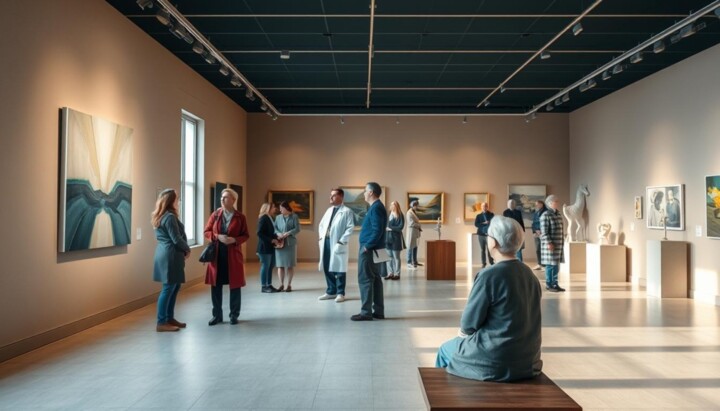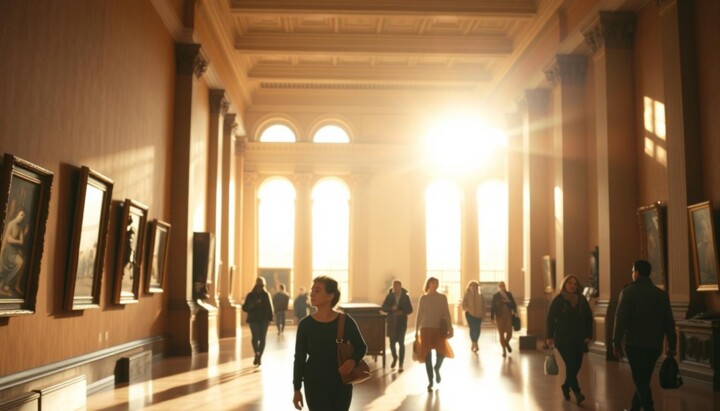Key Points
- The Neuchâtel pilot project will last two years with a budget of CHF 10,000.
- 500 museum prescriptions were distributed by local doctors.
- Based on WHO research linking the arts to mental health and cognitive risk reduction.
- Inspired by Montreal's museum prescription program launched in 2019.
- Targets post-pandemic isolation by encouraging outdoor activity through cultural engagement .
Neuchâtel , Switzerland, is leading the way with a new program. Doctors can now prescribe free museum visits as part of mental health care. This two-year pilot project is funded with 10,000 Swiss francs and provides free admission to Neuchâtel's four museums.
This initiative follows a 2019 study by the World Health Organization, which showed that artistic engagement can reduce the risk of cognitive decline and improve mental well-being. Already, more than 500 prescriptions have been given to residents of this town of 46,000.

Neuchâtel, a small town in Switzerland, has launched an innovative program that could revolutionize the connection between mental health and the arts. Doctors can now prescribe free museum visits as part of the treatment of mental health disorders. This pilot project, funded with 10,000 Swiss francs, gives residents free access to the town's four museums.
A program supported by international studies
This initiative follows a 2019 study by the World Health Organization (WHO), which demonstrated the benefits of art on mental health. According to this study, artistic engagement can not only improve emotional well-being but also reduce the risk of cognitive decline, particularly among older adults. Neuchâtel's program is therefore part of a broader approach that recognizes cultural activities as effective ways to maintain and improve mental health. In just a few months, more than 500 prescriptions have already been given to residents of this city of 46,000.
A model for combating pandemic isolation
Neuchâtel's program also addresses a pressing need highlighted by the COVID-19 pandemic: social isolation. Lockdowns have shown how essential cultural activities are to individual well-being, both emotionally and physically. "With cultural venues closed, people have realized how much they need them to feel better," explains Julie Courcier Delafontaine, a member of the city council.
Visiting museums provides a valuable opportunity to escape isolation and reconnect with culture. But more importantly, it allows patients to engage in gentle physical exercise while engaging intellectually—two essential factors in countering the adverse effects of prolonged isolation.

Art therapy inspired by Montreal
The concept of art therapy isn't new. In 2019, the Montreal Museum of Fine Arts introduced a similar program, in which doctors prescribed museum visits to help patients prepare for surgery. Dr. Marc-Olivier Sauvain, one of the pioneers of this model, points out that light physical activity, such as walking through galleries, combined with intellectual stimulation, has positive effects on mental health.
Pre-surgical patients who participate in this program not only benefit from a less stressful environment before their operations, but also from better mental preparation. According to Dr. Sauvain, more than 70% of patients reported better pre-surgical preparation after structured museum visits.
The Impact of Art Therapy
The benefits of this program are numerous and span a wide range of areas. Studies confirm that visiting museums can reduce stress and anxiety levels, and even promote mental resilience. For example, 312 scientific studies have proven that programs like the one in Neuchâtel promote well-being and improved emotional health. Research also shows that engaging in cultural activities boosts cognitive function and helps reduce symptoms related to depression and anxiety.
The benefits of walking in museums, low-impact but practiced regularly, also improve the mobility and physical endurance of patients, particularly those with chronic illnesses. Cultural mediator Marianne de Reynier explains that even short visits to museums can break the negative thought cycles often associated with pandemic-related mental health issues.
Towards a promising future for cultural prescriptions
The success of this pilot project in Neuchâtel paves the way for the expansion of this model beyond the city. Local authorities are considering extending it to other cultural activities, such as theater and dance, to offer a broader range of treatments to patients. Although the Swiss healthcare system does not yet cover these cultural therapies, the program's initial results show strong potential for redefining the role of cultural institutions in public health.


 Jean Dubreil
Jean Dubreil